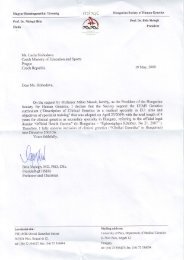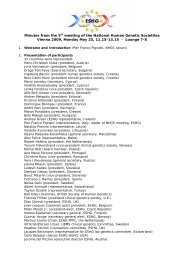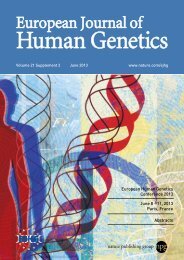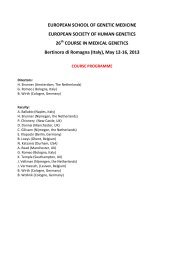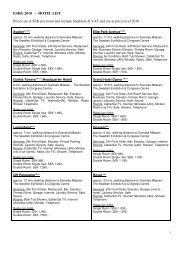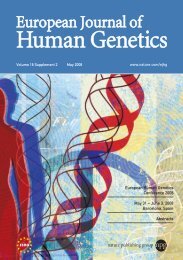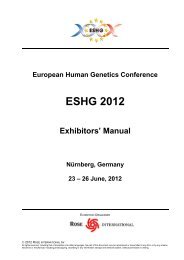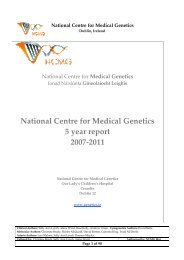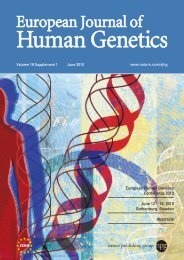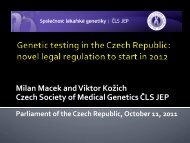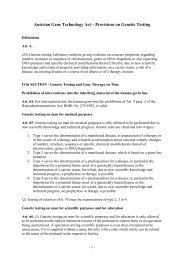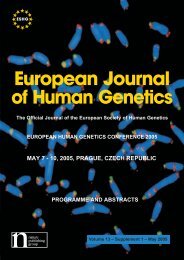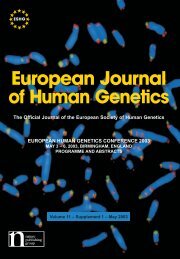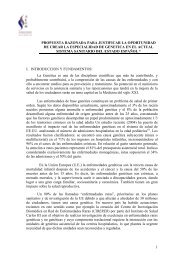2009 Vienna - European Society of Human Genetics
2009 Vienna - European Society of Human Genetics
2009 Vienna - European Society of Human Genetics
You also want an ePaper? Increase the reach of your titles
YUMPU automatically turns print PDFs into web optimized ePapers that Google loves.
Cancer genetics<br />
P06.155<br />
New roles for pharmacogenetics in metastatic colorectal cancer<br />
G. Previtali 1 , D. Marchetti 1 , A. R. Lincesso 1 , D. Barachetti 1 , L. Pezzoli 1 , R. Labianca<br />
2 , M. Barberis 3 , M. Iascone 1 ;<br />
1 Genetica Molecolare - USSD Lab. Genetica Medica, Ospedali Riuniti, Bergamo,<br />
Italy, 2 Dipartimento Oncologico, Ospedali Riuniti, Bergamo, Italy, 3 Anatomia<br />
Patologica, Ospedali Riuniti, Bergamo, Italy.<br />
The epidermal growth factor receptor (EGFR) plays an important role<br />
in tumorigenesis <strong>of</strong> colorectal cancer. Anti-EGFR monoclonal antibodies<br />
have been shown to be helpful in the treatment <strong>of</strong> patients with<br />
metastatic CRC (mCRC). Recent data indicate that kRAS mutations<br />
are an independent, negative, predictive marker for response to anti-<br />
EGFR agents.<br />
The aim <strong>of</strong> this study is to compare sequencing analysis and a commercial<br />
kit for kRAS mutation detection.<br />
Genomic DNA was extracted from archival tumour sections <strong>of</strong> 27 patients<br />
affected by mCRC.<br />
KRAS analysis was carried out by sequencing <strong>of</strong> exon 2 and realtime<br />
PCR (commercial kit) to identify somatic mutations located in codons<br />
12 and 13 (Gly12Asp, Gly12Ala, Gly12Val, Gly12Ser, Gly12Arg,<br />
Gly12Cys, and Gly13Asp). In 2 cases DNA was poor and both methods<br />
failed, probably due to old-aged. We found 10 mutated cases (10/25,<br />
40%): 5 mutations detected by both methods, 3 samples not analysable<br />
by commercial kit and 2 cases mutated for sequencing alone<br />
(both Gly13Asp). The remaining 15 cases resulted wt by sequencing<br />
and 6 <strong>of</strong> these were not analysable by commercial kit (6/15, 40%).<br />
Our results show that sequencing is the most reliable technique to<br />
detect kRAS mutations. The commercial kit has an elevate rate <strong>of</strong> failure<br />
(48%) and gives two false negative results. kRAS mutation status<br />
might allow the identification <strong>of</strong> patients who are likely to benefit from<br />
anti-EGFR agents and avoid a costly and potentially toxic administration<br />
<strong>of</strong> this treatment in nonresponder patients, that can be treated with<br />
a different therapy.<br />
P06.156<br />
two novel variants <strong>of</strong> the PML gene in breast and colon cancer<br />
patients<br />
N. Jurčková 1 , P. Plevová 1 , S. Walczysková 1 , I. Ježíšková 1 , A. Křepelová 2 , A.<br />
Puchmajerová 2 , L. Foretová 3 , E. Šilhánová 1 ;<br />
1 Faculty Hospital <strong>of</strong> Ostrava, Ostrava, Czech Republic, 2 2nd Medical Faculty <strong>of</strong><br />
Charles University, Prague, Czech Republic, 3 Masaryk Memorial Cancer Institute,<br />
Brno, Czech Republic.<br />
The PML (promyelocytic leukemia) gene is an important tumor suppressor,<br />
that encodes the PML protein. The PML protein is concentrated in<br />
special subnuclear structures, the so-called PML nuclear domains and<br />
it plays a role in the formation and stability <strong>of</strong> these domains. PML harmonically<br />
coordinates and controls transcription, antiviral response,<br />
DNA damage repair, senescence, induction <strong>of</strong> apoptosis and growth<br />
arrest. We were testing the hypothesis, that germline disruption <strong>of</strong> the<br />
PML gene may predispose to an increased risk <strong>of</strong> the cancer development.<br />
We used direct sequencing for mutation screening in 17 colon<br />
and 22 breast cancer patients. We have found, among others, two<br />
novel single nucleotide substitutions, c.83C>T (p.T28I) within exon 1 in<br />
a 42-years old female breast cancer patient and c.1558C>T (p.P520S)<br />
within exon 6 in a 32-years old male colon cancer patient. We have<br />
performed a population study in 100 and 214 non-cancer patients, respectively,<br />
using the RT-PCR method, in order to detect the frequency<br />
<strong>of</strong> these novel variants in general population. None <strong>of</strong> the variants was<br />
found in any non-cancer patients. In conclusion, we have found two<br />
rare novel missense variants in the PML gene. Their pathogenicity is<br />
uncertain, however, with respect to fact, that they were found only in<br />
cancer patients, they may be associated with an increased risk <strong>of</strong> the<br />
cancer.<br />
Acknowledgements: The work was supported by IGA MZ ČR,<br />
project No. NR/9092-3.<br />
P06.157<br />
PMS -PMS CL-”hybrid”-alleles containing pseudogene-specific<br />
sequence variants have a high prevalence but no apparent<br />
functional effect on colorectal cancer susceptibility<br />
C. Ganster 1 , N. Rahner 2 , L. Messiaen 3 , J. Necker 4 , C. Fonatsch 1 , J. Zschocke 5 ,<br />
K. Wimmer 5 ;<br />
1 Medical University <strong>Vienna</strong>, <strong>Vienna</strong>, Austria, 2 University <strong>of</strong> Bonn, Bonn, Ger-<br />
many, 3University <strong>of</strong> Alabama at Birmingham, Birmingham, AL, United States,<br />
4 5 University Basel, Basel, Switzerland, Department <strong>of</strong> Medical <strong>Genetics</strong>, Molecular<br />
and Clinical Pharmacology, Innsbruck, Austria.<br />
PMS2 and its pseudogene PMS2CL, share paralogous exons 9 and<br />
11-15 and are embedded in an inverted duplication on chromosome<br />
7p22. Sequence exchange between duplicons may lead to functional<br />
PMS2-“hybrid”-alleles containing PMS2-specific sequence variants at<br />
the 5’- and PMS2CL-specific variants at the 3’-ends. The reference sequences<br />
thus cannot be relied upon to distinguish between gene and<br />
pseudogene. We previously reported an RNA-based assay that allows<br />
reliable mutation analysis and unequivocal identification <strong>of</strong> PMS2-“hybrid”-alleles.<br />
We now found that overall “hybrid” alleles account for one<br />
third <strong>of</strong> 300 PMS2 alleles in control individuals. Depending on the population<br />
14-60% <strong>of</strong> “hybrid”-alleles carry PMS2CL-specific sequences<br />
in exons 13-15, the remainder only in exon 15. Analysis <strong>of</strong> associated<br />
polymorphisms revealed that exons 13-15 “hybrid”-alleles constitute<br />
four different haplotypes but involve the same breakpoint and appear<br />
to trace back to a single ancient founder event. We identified one sequence<br />
variant specific for all exons 13-15 “hybrid”-allele and developed<br />
a simple gDNA-PCR assay that can be used to identify carriers<br />
<strong>of</strong> “hybrid”-alleles with high sensitivity and specificity (100% and 98%,<br />
respectively). This test may render PMS2 mutation analysis in diagnostic<br />
laboratories more reliable. Exon 13-15 “hybrid”-alleles harbour<br />
a missense variant <strong>of</strong> so far unknown functional significance, and we<br />
used the novel assay to determine “hybrid”-allele carrier frequency in<br />
colorectal cancer patients. We found no significant difference in allele<br />
frequencies between patients and controls, indicating that the missense<br />
variant is unlikely to play a major role with regard to colorectal<br />
cancer susceptibility.<br />
P06.158<br />
case report <strong>of</strong> cRc family with two substitutions in APc gene<br />
R. Sitkova1 , A. Boday1 , K. Kyselova1 , P. Falt2 , P. Fojtik2 , M. Kliment2 , P. Riedlova1<br />
, E. Prusova1 , S. Tavandzis1 ;<br />
1 2 JG Mendel Cancer Centre, Novy Jicin, Czech Republic, Digestive Diseases<br />
Centre, Vitkovice Hospital a.s., Ostrava, Czech Republic.<br />
Familial adenomatous polyposis (FAP) is an autosomal dominant inherited<br />
disease characterized by the presence <strong>of</strong> hundreds to thousands<br />
colorectal adenomatous polyps and several clinical manifestations.<br />
FAP is known as a colorectal cancer predisposition syndrome<br />
and is caused by a mutation in the tumor-supressor APC gene which<br />
<strong>of</strong>ten leads to creation <strong>of</strong> truncated APC protein.<br />
In this report we demonstrate case <strong>of</strong> 3 generation family from our<br />
group <strong>of</strong> CRC patients. Proband, 30-year old woman, was involved in<br />
extensive colorectal carcinoma and after detailed clinical examination<br />
and pedigree assembly it was confirmed FAP diagnosis. Subsequently<br />
it was performed analysis <strong>of</strong> APC gene with detection <strong>of</strong> 2 substitutions<br />
- causal mutation c.2413C>T (p.Arg805X) and mutation c.7504G>A<br />
(p.Gly2502Ser) with unexplained influence on FAP genesis.<br />
It occurs comparatively a lot <strong>of</strong> relatives with various diagnosis <strong>of</strong> cancer<br />
in the proband´s family and there are also 7 children in risk. Our<br />
aim was to make APC gene analysis <strong>of</strong> this children and other living<br />
proband´s relatives to determine whether this substitions occur on one<br />
allele <strong>of</strong> APC gene together or on two alleles separately. This molecular<br />
results are important for determination <strong>of</strong> the FAP manifestation<br />
risk and for selection <strong>of</strong> family members for preventive oncological<br />
monitoring.<br />
P06.159<br />
Zoom-in cGH-array to better characterize germline large<br />
rearrangements involving APc gene in FAP French families<br />
E. Rouleau1 , A. Lagarde2 , S. Tozlu-Cara1 , V. Bourdon3 , C. Andrieu1 , T.<br />
Noguchi3 , R. Sauvan3 , F. Eisinger3 , L. Huiart3 , R. Lidereau1 , H. Sobol3 , S.<br />
Olschwang2 ;<br />
1 2 Centre René Huguenin, St Cloud, France, Institut Paoli-Calmettes,<br />
CRCM UMR891, Marseille, France, 3Institut Paoli-Calmettes, Département<br />
d’oncogénétique, Marseille, France.<br />
Familial Adenomatous Polyposis is caused by germline mutations in<br />
the APC gene. Most mutations are point mutations or small insertions/<br />
deletions. Six to 12% <strong>of</strong> FAP patients carry a large deletion within the<br />
APC gene, which encompass one to all exons. Until now, most articles<br />
reported large deletions without precisely characterize the breakpoints<br />
and/or the mechanism. Here, we aimed to assess the proportion <strong>of</strong><br />
0



